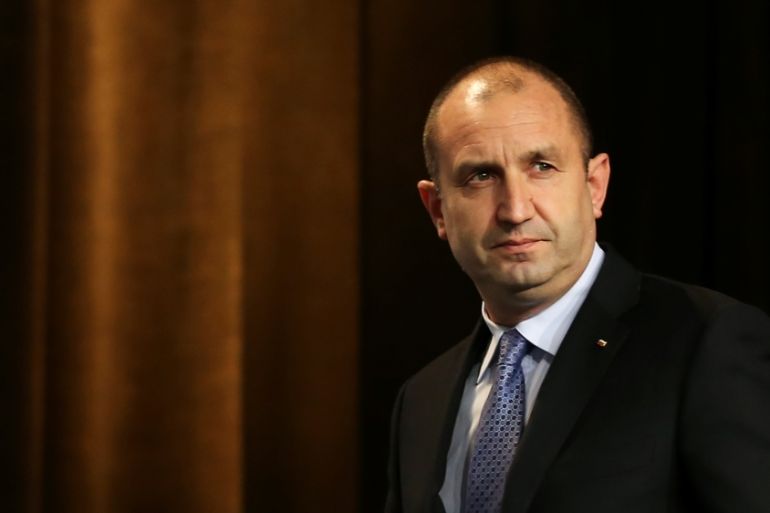Pro-Russia Rumen Radev wins Bulgarian presidency
Former air force commander who has called for an end to EU sanctions against Russia wins election by wide margin.

Pro-Russia, anti-migration candidate Rumen Radev won the Bulgarian presidential election, partial official results showed on Monday.
Former air force commander Radev won 59.4 percent of the vote, compared with 36.2 percent for the candidate of the ruling centre-right GERB party, Tsetska Tsacheva, with 99.3 percent of polling stations counted.
Bulgaria faces an uncertain future after centre-right Prime Minister Boyko Borisov quit his post following the crushing defeat of his presidential nominee at the hands of Radev.
|
|
“The results clearly show that the ruling coalition no longer holds the majority,” the premier, who was re-elected in 2014 for a second time, said on Sunday evening.
“I apologise to those who supported us. I thought I was doing the right thing.”
Radev, a former fighter jet pilot and novice to politics, has tapped into public anger with political elites and fears about immigration, and vowed not to make the Balkan country a “migrant ghetto”.
Despite promised reforms, corruption and poverty remain rife in the European Union’s poorest member state, while public anger has grown over thousands of migrants currently stranded in Bulgaria.
Speaking on Sunday evening, Radev said that he hoped for good dialogue with both the United States and Russia, and expressed hopes that with a new president in Washington, there will be a drop in confrontation between the West and Moscow.
READ MORE: Bulgaria – Prime Minister Boiko Borisov resigns
“In his election campaign [Donald Trump], already elected, said clearly that he will work for a better dialogue with Russia. That gives us hope, a big hope, for a peaceful solution to the conflicts both in Syria and in Ukraine and for a decrease of the confrontation,” Radev said.
The country of 7.2 million people already has warmer ties with Russia than most of its EU peers. Radev has made it clear he believes Bulgaria, a NATO member, should focus more on its economic and political ties with Moscow, which has been under EU sanctions since it annexed Crimea from Ukraine in 2014.
Under Bulgaria’s constitution, the president’s job is mostly ceremonial, but whoever holds the post can influence policy, veto legislation and sign international treaties.
Radev is due to take office on January 22 for a five-year term. His first job will probably be to call early elections in spring next year, after Borisov said on Sunday that he would refuse to form an interim government.